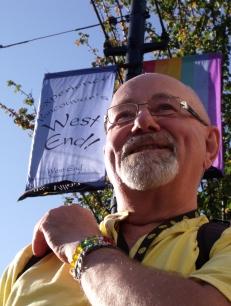A mainstream seniors’ centre in Vancouver wants to reach out to isolated and closeted older gay people. The Bridges project at the 411 Seniors Centre will use a resource library, online blogging and social events to provide a gateway to the gay community.
“A lot of older and aging queers are isolated. That’s a generality, but that is the concern,” project manager Ray Lam says.
“Many are afraid to come out, or don’t feel comfortable coming out, because they depend on other facilities and are concerned about the ramifications.
“We are trying to give an outlet to people, such as those in homes or living with family, who might be afraid to come out and are more marginalized.”
The Bridges website is scheduled to be unveiled by the end of October, alongside blogging workshops and in-house and online queer resources.
Although other seniors’ programs are available — such as Qmunity’s Generations — Bridges is directed at people with limited or no contact with the gay community.
“By using the blogging system, we’re not immediately outing people by asking them to come to a queer event,” Lam explains. “They can share stories and engage with dialogue online.” According to Lam, 411 is “one of the very few” seniors’ centres actively engaging with older and aging gay people.
Neil Stark, 411’s operations director, told Xtra the centre sought federal government funding for Bridges as part of its commitment to diversity. “Being an inclusive centre, the project is important to us, as it both supports and empowers not only our members and seniors who visit our centre, but the community at large,” Stark says. “Such an initiative furthers our resolve to be an advocate in building a community in which we all want to live.”
The project’s steering committee includes representatives from the Vancouver Prime Timers and the Quirk-e writing collective, as well as former city councillor Alan Herbert and Generations community developer Alexandra Henriques.
Henriques believes all seniors’ centres should adopt queer-aware approaches so venues and activities are accessible to every gay person. “But that’s not the reality so far,” she acknowledges, noting that many gay people have “big concerns” about finding a comfortable environment as they age.
“It’s very much an ongoing concern: What’s going to happen to me if I need to go into a home or if I’m incapacitated. Where will I go to access culturally appropriate services?” Henriques says.
Generations participant Robert St Julian agrees the Bridges project is needed. St Julian, 74, is aware of closeted people at the 200-person seniors’ complex where he lives. He has experienced homophobia from other tenants and admits, “I don’t feel comfortable where I am.”
St Julian has organized gay-themed events at the complex and continues to add gay information to its resource office. He feels the situation is slowly improving. “Apparently two men kissed at a coffee event the other day,” he says. “There’s a changed energy. Gay people are coming into the building and being accepted, so I feel I’ve broken down some barriers, even if I’ve taken some of the heat. [The environment] is more relaxed. It was so full of fear and homophobia.”
Lam hopes Bridges will also provide a creative forum for older gay people, who can either blog on a subject of their choice or contribute to a suggested topic. “Older and aging people like to share their stories, and we will be archiving their history in a permanent place,” he says.

 Why you can trust Xtra
Why you can trust Xtra


